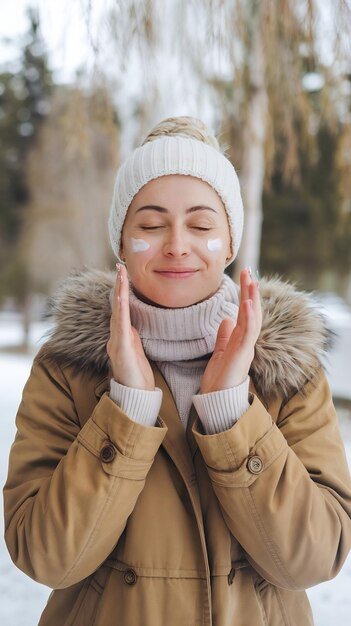Winter can be tough on the skin. The colder months bring low humidity, harsh winds, and dry indoor heating, all of which can strip your skin of moisture and lead to dryness, irritation, and flakiness. But with a few adjustments, you can maintain a radiant, healthy complexion all season long. This guide will help you understand what changes to make in your skincare routine to protect your skin from winter’s challenges, with practical steps and product tips for every skin type.
1. Understand the Impact of Cold Weather on Your Skin
Before we dive into routines, it’s important to understand how cold weather affects the skin. Winter air is often dry, with low humidity levels that draw moisture away from the skin. Add to that the effects of central heating and hot showers, and the result can be parched, sensitive skin. Cold air can also make the skin more susceptible to damage, as natural oils that act as a protective barrier get stripped away.
Common winter skin issues include:
- Dryness: The most common concern, with skin often feeling tight and flaky.
- Redness and irritation: Harsh winds and fluctuating temperatures can cause sensitivity and redness.
- Dullness: With less humidity, the skin can lose its natural glow, appearing tired and lackluster.
Adapting your routine is the best way to keep your skin balanced and protected during the colder months. Let’s break down an ideal winter skincare routine.
2. Switch to a Gentle, Hydrating Cleanser
Your cleanser is the first step in your skincare routine, but in winter, it’s best to avoid anything too harsh or drying. Cleansers with strong surfactants can strip away your skin’s natural oils, leaving it even drier and prone to irritation.
- Look for Cream or Oil-Based Cleansers: These types of cleansers are typically gentler on the skin and help maintain moisture.
- Avoid Foaming Cleansers with Sulfates: Sulfates can be too stripping in cold weather. Instead, look for sulfate-free cleansers that are more skin-friendly.
- Use Lukewarm Water: Hot water might feel good, but it can dry out the skin even more. Stick to lukewarm water to protect your skin’s natural barrier.
- Top Product Recommendation: Opt for a cleanser with hydrating ingredients like hyaluronic acid or glycerin to ensure your skin stays soft and supple.
3. Exfoliate, But Not Too Often
Exfoliation is essential to remove dead skin cells and promote cell turnover, which is especially beneficial in winter to prevent dullness. However, over-exfoliating can strip away moisture, making dry skin even worse.
- Limit Exfoliation to Once or Twice a Week: This keeps skin fresh without causing irritation.
- Choose Gentle Exfoliants: Look for gentle chemical exfoliants like lactic acid, which are milder than stronger acids. Avoid harsh physical scrubs, as they can be too abrasive.
- Avoid Exfoliating When Skin is Inflamed: If your skin is already sensitive or irritated from the cold, skip exfoliation until it’s calmed down.
- Top Product Recommendation: A lactic acid serum or a gentle enzyme mask can keep skin looking fresh without causing dryness.
4. Use a Hydrating Toner or Essence
In winter, a hydrating toner or essence can give your skin an extra moisture boost and prepare it to absorb your serums and moisturizers more effectively. This step is particularly useful if your skin feels tight or dry throughout the day.
- Look for Soothing Ingredients: Hyaluronic acid, aloe vera, and glycerin are excellent options that draw moisture into the skin.
- Avoid Astringent Toners: Alcohol-based toners can be very drying and are best avoided in winter.
- Top Product Recommendation: A toner or essence with hyaluronic acid or chamomile will provide soothing hydration, making it a great addition to a winter skincare routine.
5. Layer on a Hydrating Serum
Serums are concentrated products that deliver active ingredients deep into the skin, and in winter, a hydrating serum is essential. It adds moisture and helps prevent the dryness that leads to flakiness and discomfort.
- Choose a Hyaluronic Acid Serum: Hyaluronic acid can hold up to 1,000 times its weight in water, making it an ideal ingredient for boosting hydration.
- Consider Adding Niacinamide: Niacinamide, also known as vitamin B3, helps improve the skin’s barrier function and retain moisture.
- Use Both Day and Night: Hydrating serums can be applied both morning and evening to keep skin hydrated around the clock.
- Top Product Recommendation: A hyaluronic acid serum layered under your moisturizer will lock in moisture and keep your skin feeling plump.
6. Moisturize Intensely and Frequently
A good moisturizer is the cornerstone of any winter skincare routine, creating a protective barrier to lock in hydration and protect against the elements. In winter, consider switching to a thicker, richer moisturizer to provide more substantial hydration.
- Choose a Rich, Emollient Cream: Ingredients like shea butter, ceramides, and squalane are great for creating a barrier that locks in moisture.
- Consider Overnight Masks for Extra Hydration: If your skin is particularly dry, an overnight hydrating mask can help restore moisture while you sleep.
- Apply on Damp Skin: Applying moisturizer on slightly damp skin helps seal in hydration and enhances the effectiveness of the product.
- Top Product Recommendation: A ceramide-rich cream or a product with squalane can offer deep, long-lasting hydration without feeling greasy.
7. Don’t Forget Sunscreen
It might seem counterintuitive to use sunscreen in winter, but UV rays can still damage your skin even when it’s cold or cloudy. Snow can also reflect UV rays, increasing your exposure.
- Use a Broad-Spectrum SPF 30 or Higher: This ensures you’re protected against both UVA and UVB rays.
- Opt for Moisturizing Sunscreens: Many sunscreens now come with hydrating ingredients, which can help prevent the dryness often caused by traditional sunscreens.
- Apply Daily, Even Indoors: UV rays can penetrate through windows, so it’s best to wear SPF even if you’re spending most of your time indoors.
- Top Product Recommendation: Look for a hydrating, lightweight sunscreen that sits well under makeup and doesn’t leave a white cast.
8. Protect Your Lips and Hands
Your lips and hands are especially vulnerable to the effects of cold weather, often becoming chapped or cracked without extra protection. These areas require targeted care to stay hydrated and soft.
- Lip Balm with SPF: Choose a hydrating lip balm with SPF to prevent chapping and sun damage.
- Hand Cream with Ceramides or Shea Butter: A rich hand cream can prevent hands from becoming dry and cracked. Apply frequently throughout the day.
- Wear Gloves Outside: Not only will gloves keep your hands warm, but they’ll also protect your skin from cold air and wind.
- Top Product Recommendation: A lanolin or beeswax-based lip balm and a thick hand cream will provide effective protection against winter dryness.
9. Add a Humidifier to Your Routine
Indoor heating can be extremely drying, which affects your skin, making it feel tight and uncomfortable. A humidifier can help restore moisture to the air in your home, creating a more skin-friendly environment.
- Use in Your Bedroom While You Sleep: Running a humidifier in your bedroom can improve the moisture levels in your skin by morning.
- Place in Common Areas: If possible, use a humidifier in rooms where you spend a lot of time, such as the living room or home office.
- Top Product Recommendation: Invest in a cool-mist humidifier to help alleviate dry skin and maintain a healthy moisture balance.
Conclusion: Keeping Skin Healthy and Hydrated All Winter Long
Adapting your skincare routine for winter is essential to protect your skin against the cold weather. From switching to a hydrating cleanser to investing in richer moisturizers, each step plays a role in keeping your skin smooth, comfortable, and glowing through the colder months. By following these tips and making a few small adjustments, you can maintain a healthy, radiant complexion all winter long.
Embrace these winter skincare essentials and enjoy a season of fresh, glowing skin despite the chill outside!













